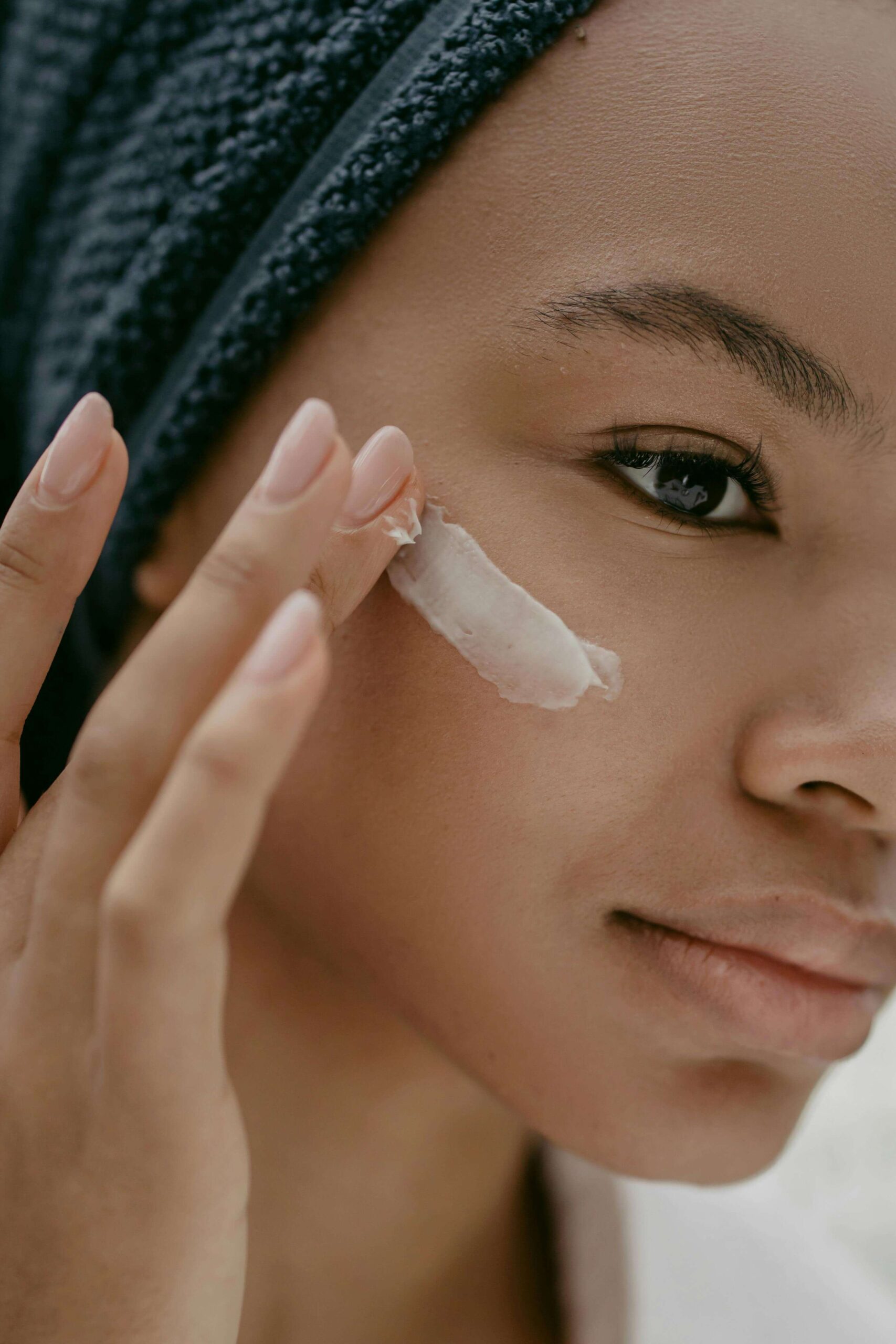The Ultimate Guide to Retinoids: Benefits, Types, Usage, and Product Recommendations
When it comes to skincare, few ingredients are as universally transformative as retinoids. Backed by decades of scientific research, retinoids remain the gold standard for tackling a wide range of skin concerns, from fine lines and wrinkles to acne and hyperpigmentation. If you’re looking to boost your skin’s health, radiance, and resilience, a retinoid-based routine might just be your ultimate solution.
This guide explores everything you need to know about retinoids—from the science behind their effectiveness to practical advice on how to incorporate them into your regimen.

What Are Retinoids?
Retinoids are derivatives of vitamin A, an essential nutrient known for its vital role in maintaining vision, immune function, and, most importantly for us, skin health. In skincare, retinoids work by penetrating the epidermis (outer skin layer) and reaching the dermis (deeper skin layer), where they stimulate cellular activity.
The primary function of retinoids is their conversion into retinoic acid, the biologically active form of vitamin A. Retinoic acid interacts with the skin’s retinoic acid receptors (RARs) to regulate cell behavior. This regulation triggers several benefits, such as:
- Accelerated skin cell turnover.
- Enhanced collagen and elastin production.
- Reduction in melanin production for a more even skin tone.
The depth of action and effectiveness depend on the type of retinoid used, its concentration, and how it is formulated.
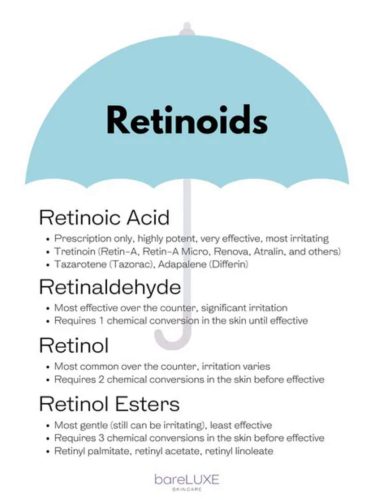
The Science Behind Retinoids
Retinoids primarily function by binding to nuclear receptors in the skin, specifically the RAR and RXR receptors. Once activated, these receptors signal changes in gene expression, promoting keratinocyte proliferation and differentiation. This results in healthier skin cells replacing older, damaged ones at an accelerated pace.
Retinoids also inhibit matrix metalloproteinases (MMPs), enzymes that break down collagen in the skin. By doing so, they preserve the structural integrity of the dermis, helping to maintain firmness and elasticity.
Additionally, retinoids modulate melanogenesis, the process by which melanin is produced. This makes them highly effective for reducing hyperpigmentation caused by sun damage, aging, or post-inflammatory pigmentation.
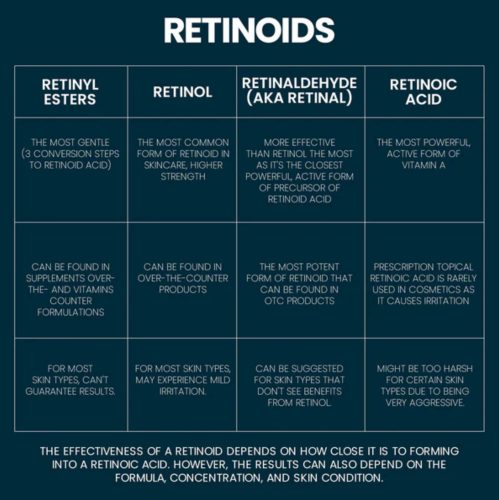
The Many Benefits of Retinoids
Retinoids offer an array of benefits that make them indispensable in any well-rounded skincare regimen. Let’s break these benefits down in detail:
1. Anti-Aging Power
The most celebrated benefit of retinoids is their ability to combat signs of aging. By increasing collagen production and reducing collagen degradation, retinoids improve skin elasticity, reduce the depth of wrinkles, and create a plump, youthful appearance.
2. Acne Treatment
Retinoids are a cornerstone in acne management. They prevent the formation of microcomedones (the precursors to blackheads and whiteheads) by normalizing cell turnover and unclogging pores. Many dermatologists recommend retinoids as a first-line treatment for mild to moderate acne.
3. Hyperpigmentation and Melasma
By downregulating tyrosinase (a key enzyme in melanin production), retinoids help fade dark spots and even out skin tone. They are also effective for treating melasma, especially when combined with other depigmenting agents.
Beyond hydroquinone, other powerful melanin inhibitors that can be combined with retinoids for hyperpigmentation and melasma treatment include:
- Vitamin C (Ascorbic Acid) : A potent antioxidant that inhibits tyrosinase activity, reducing melanin formation.
- Alpha Arbutin : A naturally derived skin-brightening agent that works by inhibiting tyrosinase activity, making it a gentle alternative to hydroquinone.
- Licorice Extract : Contains glabridin, which suppresses melanin synthesis and helps brighten dark spots.
- Kojic Acid : A well-known ingredient that lightens hyperpigmentation by inhibiting melanin production.
- Niacinamide (Vitamin B3) : Known to inhibit melanosome transfer, helping to lighten dark spots and even out skin tone.
- Tranexamic Acid : A potent ingredient that reduces melasma by inhibiting the production of melanin and preventing its spread.
4. Texture and Tone Improvement
Retinoids refine skin texture by encouraging exfoliation and smoothing rough patches. This is particularly beneficial for people dealing with scarring or uneven texture caused by acne or environmental damage.
5. Increased Radiance
A hallmark of healthy skin is its natural glow. By removing dead skin cells from the surface, retinoids reveal fresh, vibrant skin underneath, giving your complexion a radiant, healthy appearance.
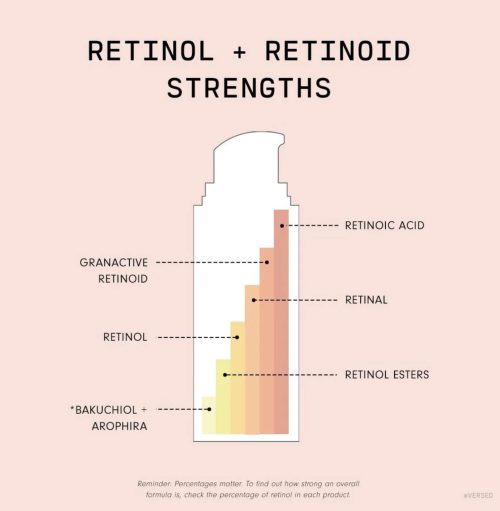
Types of Retinoids: Which One Is Right for You?
1. Retinyl Esters
Retinyl esters, such as retinyl palmitate, are the weakest form of retinoids. They undergo multiple steps of conversion before becoming active retinoic acid, making them gentle and suitable for sensitive skin.
2. Retinol
The most common over-the-counter option, retinol requires two conversions (to retinaldehyde and then to retinoic acid) to become active. While not as potent as prescription retinoids, it’s highly effective with consistent use.
3. Retinaldehyde (Retinal)
Retinaldehyde is a step above retinol in terms of potency. It requires only one conversion to retinoic acid, making it faster-acting while still being tolerable for most skin types.
4. Tretinoin (Retin-A)
Tretinoin is a prescription-only retinoid and the purest form of retinoic acid. It delivers the fastest results but comes with a higher risk of irritation, especially for beginners.
5. Adapalene (Differin)
Adapalene is a synthetic retinoid designed specifically for acne treatment. It has anti-inflammatory properties and is now available over the counter.
6. Bakuchiol
Although not a true retinoid, bakuchiol mimics the effects of retinoic acid and is an excellent option for those with very sensitive skin or those seeking plant-based alternatives.
How to Use Retinoids Effectively
To reap the full benefits of retinoids while minimizing irritation, follow these steps:
- Start Low and Slow : Introduce retinoids gradually to your routine, starting with 2-3 nights per week. Allow your skin to build tolerance before increasing frequency.
- Apply to Dry Skin : Moisture can increase the penetration of retinoids, potentially causing irritation. Always wait for your skin to dry completely after cleansing.
- Use a Moisturizer : A good moisturizer can buffer the skin, reducing dryness and peeling associated with retinoids.
- Incorporate Sunscreen : Retinoids make the skin more susceptible to UV damage. Always use a broad-spectrum sunscreen with at least SPF 30 during the day.
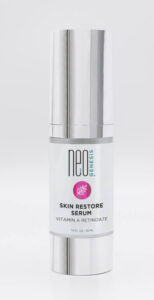
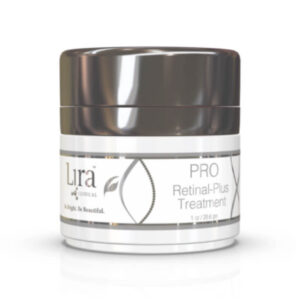
Popular Retinoid-Based Products
NeoGenesis Skin Restore Serum
Ingredients : Retinoate, hyaluronic acid, and peptides. Benefits : Improves hydration, firms skin, and reduces redness.
Lira Clinical Pro Retinal Plus Treatment
Ingredients : Hydroxysome Retinaldehyde, Bakuchiol, Vitamin C, and Niacinamide. Benefits : Targets wrinkles, evens tone, and provides antioxidant protection.
Osmosis Calm Gentle Retinal Serum
Ingredients : 0.0375% Retinaldehyde and liposomal collagen. Benefits : Brightens and soothes sensitive skin.
Face Reality B3 Serum
Ingredients : 5% Niacinamide, Zinc PCA, and Retinol. Benefits : Enhances barrier repair, reduces redness, and controls oil production. Particularly effective for acne-prone and oily skin types.
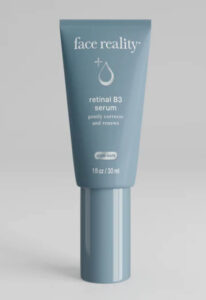
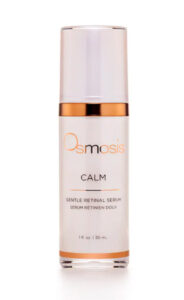

The Future of Retinoids
Researchers are continually improving retinoid formulations to enhance efficacy while minimizing side effects. Advances include encapsulation technology, which allows for slower, more controlled release of retinoids, reducing irritation and increasing tolerability.
New studies are also exploring combinations of retinoids with other active ingredients, such as niacinamide, to create synergistic effects for various skin concerns.
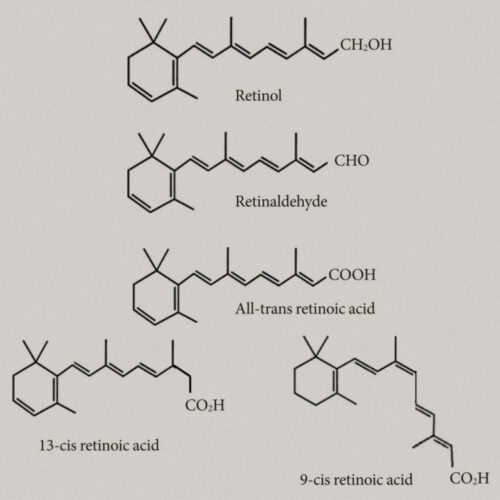
Book a Skincare Consultation in Katy, Texas
Retinoids are a cornerstone of modern skincare for a reason—they deliver proven results backed by science. By understanding the different types, benefits, and proper usage, you can confidently incorporate retinoids into your routine and achieve your healthiest skin yet.
If you’re unsure which retinoid is best for your skin, book a consultation with Anita’s Skincare Clinic in Katy, Texas. Let our trained esthetician design a personalized skincare regimen tailored to your needs.
Your journey to radiant, youthful skin starts here.

